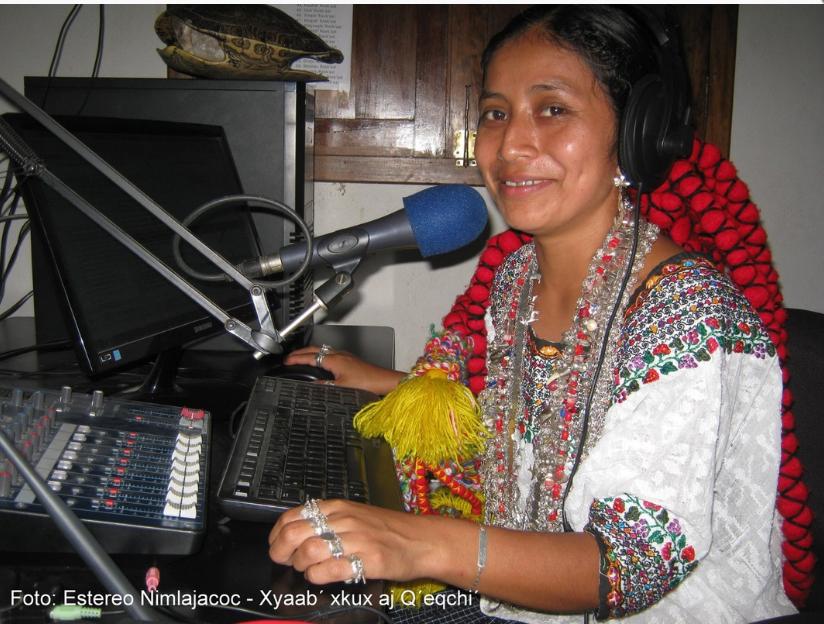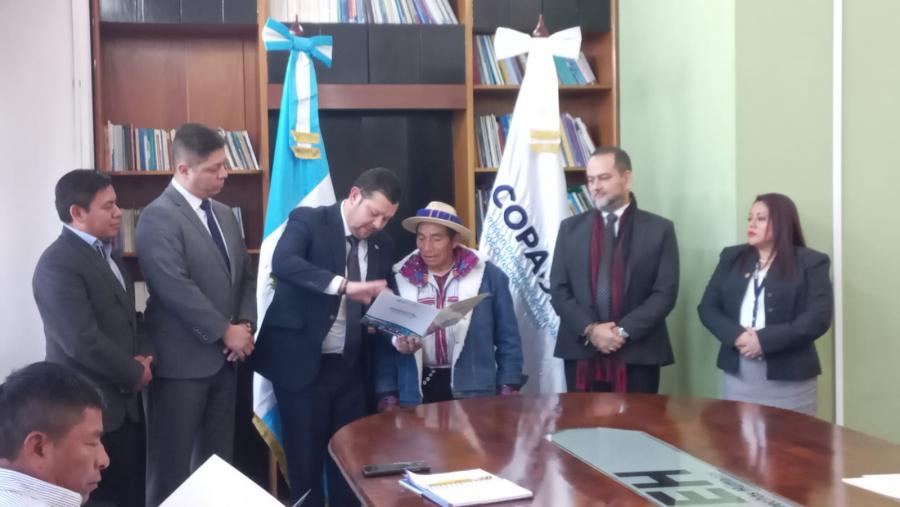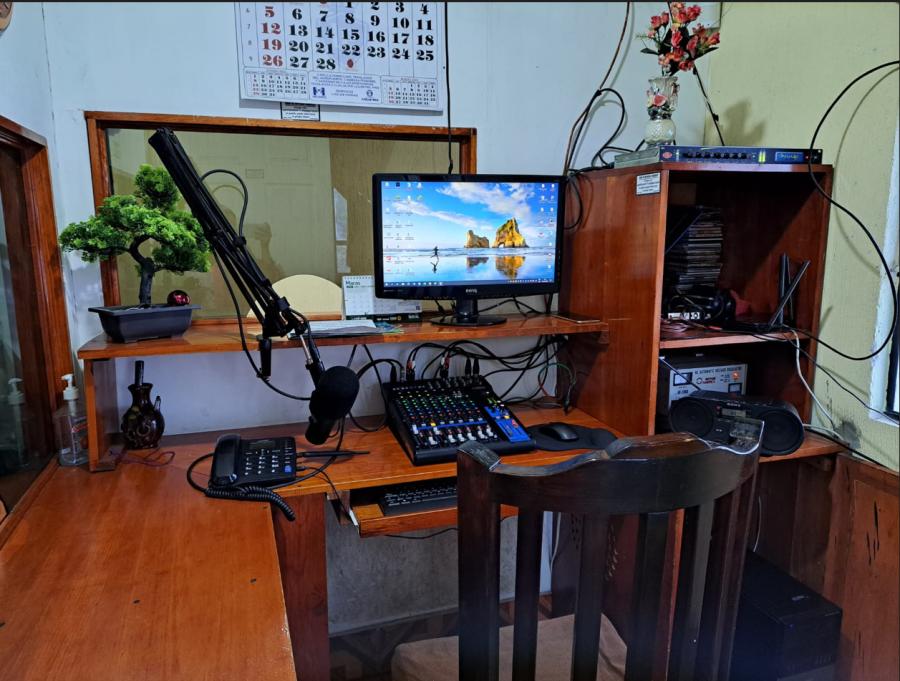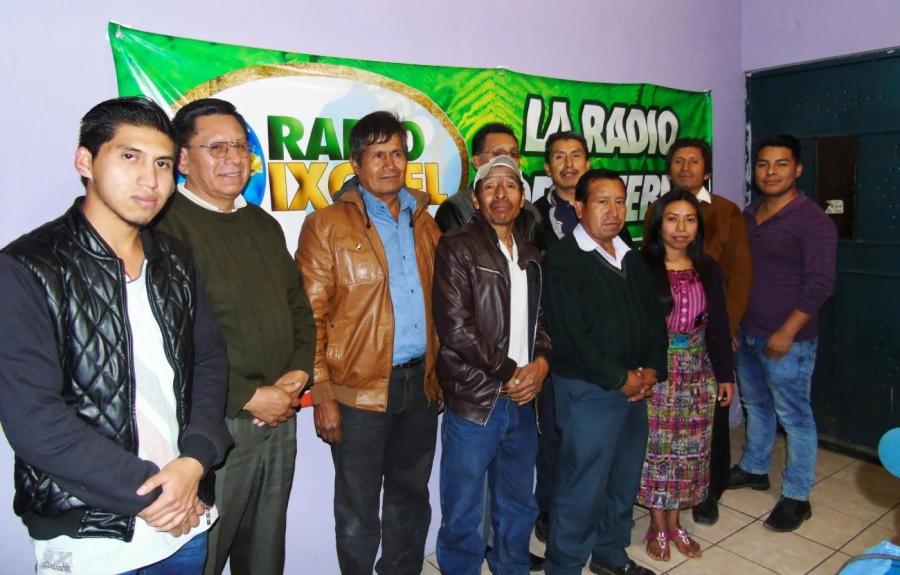
Avexnim Cojti
Only two buses go to Nimlajacoc every day from the nearest major town of Coban, Guatemala. Nimlajacoc is at a three and a half hour drive on shoddy roads. In October, I visited the the Q’eqchi’ community to support them in their application for funds from Cultural Survival’s Community Media Grants Project, what I found was an organized community who are a model of Indigenous resilience.
In the 1980’s, impacted by the Guatemalan civil war, many Nimlajacoc families were assassinated, disappeared, displaced, or forced to seek refuge in the mountains, other part of the country, or abroad. Many communities disappeared from their ancestral territories, many became strangers in other lands, and many lost their ancestral ways of community organization.
After the conflict, survivors from the area convened to analyze, reorganize, and reestablish communication and to support each other. Most of the communication between the survivors was conducted through letters which sometimes would reach after a meeting had already passed. Because of long distances between the 30 communities, bad road conditions, and a lack of electricity, the ancestral authorities were urged to start a community radio station in the Nimlajacoc region powered by a gasoline generator.
Another reason for launching a community radio station was to address the abandonment of the community by municipal and national governments for their resistance to a hydroelectric project which threatened to destroy their rich natural resources. In the 1980’s the Xalala Hydroelectric began construction in the region but was stopped during the civil war. After the 1996 Peace Accords, the project was revived. The people of Nimlajacoc resisted the project arguing that it would devastate the region impacting local natural resources, that a proper environmental impact assessment has not been conducted, and that their right to Free, Prior and Informed Consent was not respected.
To this day, the Xalala hydroelectric project is on hold and municipal governments have targeted the Nimlajacoc community by refusing to provide basic public services like roads and electricity. In the past, municipal majors have placed conditions that electricity could be provided if the community accepted the hydroelectric project. The community of Nimlajacoc live in uncertainty as the hydroelectric project could be renewed at any time. The local Maya Council, representing the 30 Q’eqchi’ communities, have agreed not to accept this project and decided to establish a radio station to inform their people about their identity and history as Indigenous Peoples with ancestral rights to their lands and resources.
On October 13, 2012, after three years of community work, the Council obtained international funding and Radio Nimlajacoc started broadcasting on 92.1 FM. Since then, the radio station plays a strong role in strengthening the community working towards a better quality of life for all, reviving Maya culture and values, and engages listeners in exercising rights.
The station gives voice to community councils and the Regional Maya Council in Nimlajacoc, informing communities on decisions reached by their leaders, about what is happening locally and regionally, and about their individual and collective rights as a Maya peoples. One of these rights that is especially valued is the right to their own means of communication.
Trust, solidarity, participation, and equality are what characterize the station. By providing accurate and credible information from an Indigenous perspective, the station has gained the trust of the community. The people of Nimlajacoc believe that solidarity and cooperation were passed on to them from their ancestors as values. Equality means that they cannot walk with both feet if they do not include women to work side by side.
Due to the hostile environment in Guatemala towards community radio stations, Radio Nimlajacoc has not been able to obtain a legal frequency from the Guatemalan government. Despite the fact that Guatemalan Peace Accords signed by the State promised frequencies to Indigenous communities, the current telecommunications does not allocate frequencies for community stations. Radio Nimlajacoc has supported recent efforts to approve Bill 4087, which is being opposed by the trade group that represents commercial stations. One of Radio Nimlajacoc’s goals is to be legally recognized by the Guatemalan State.
The second goal is to be a self-sustaining community radio. Nimlajacoc’s Regional Council is working with the community to find ways to be sustainable and not depend on the State. In addition to searching for international funding, they generate funds through soccer tournaments, a community kitchen, a hostel for when visitors come to the area, community drives for in-kind donations to resell or auction, and a small internet cafe. All these projects and activities are run voluntarily and are collectively owned.
Thanks to community efforts, Nimlajacoc raised two thirds of the cost for solar panels to power the station replacing the generator they currently use. In December of 2016, Cultural Survival contributed one third of the cost of the solar panels from the Community Media Grants Project. In early 2017, Cultural Survival and funding partner WACC will also fund the training of more women in community journalism to join the radio team, and the training of radio and solar panel technicians as capacity building.
When Samuel Macz, Radio Nimlajacoc Director was asked what he would you like the world to know about Nimlajacoc, he shares: “Our region is a region that even though was hit by Guatemala's internal armed conflict, is organizing itself to be strong to not dependent on municipal governments. I dream that we become autonomous and that we are able to manage and defend our land and our rights as Indigenous Peoples.”



